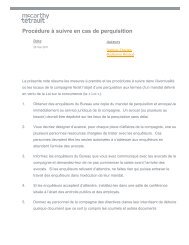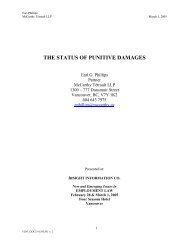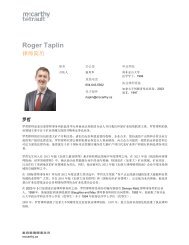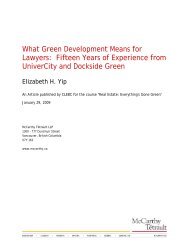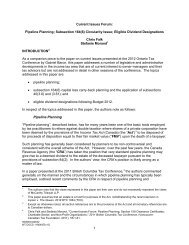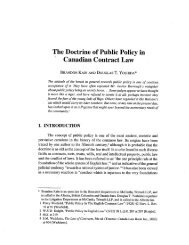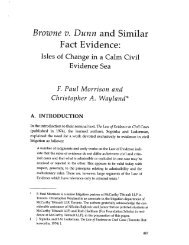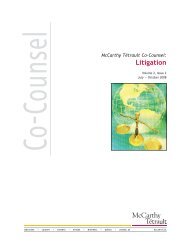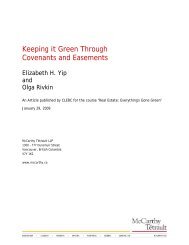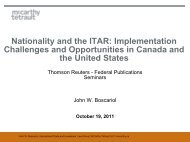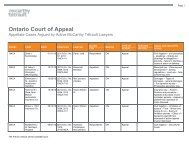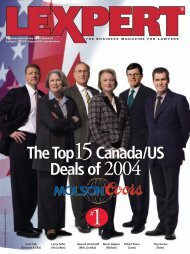1. COMPETITION - McCarthy Tétrault
1. COMPETITION - McCarthy Tétrault
1. COMPETITION - McCarthy Tétrault
You also want an ePaper? Increase the reach of your titles
YUMPU automatically turns print PDFs into web optimized ePapers that Google loves.
EDP Operators may only provide such services to financial institutions,<br />
PFS , UCIs or pension funds set up under Luxembourg or foreign laws.<br />
Pursuant to the New Law, EDP Operators will have, amongst other<br />
obligations, to obtain a license from the Ministry of Finance and to justify a<br />
share capital of at least one million and five hundred thousand euro.<br />
For more information visit:<br />
http://www.etat.lu/legilux/DOCUMENTS_PDF/MEMORIAL/memorial/a/200<br />
3/a1121408.pdf<br />
or contact: LE_GOUEFF@vocats.com<br />
8. INTELLECTUAL PROPERTY<br />
BRAZIL<br />
LEGAL PROTECTION FOR SOFTWARE<br />
On 30th June 2003, a decision of the 3rd Panel of Superior Court in<br />
Special Appeal No. 443.119/RJ extended to software the same protection<br />
that the law previously afforded to other intellectual works. The notable<br />
case marks the first time that the highest court recognized the<br />
copyrightable nature of software, which had already been expressly<br />
granted under Law 9609/98 (the "Software Law"). This decision is also<br />
notable for the penalty assessed - the infringer was penalized with<br />
damages in an amount equal to 3,000 copies of the counterfeit product.<br />
The Copyright Law provides for this amount of damages whenever<br />
identifying the number of counterfeit copies would be impossible task.<br />
For more information please contact: rapdecunto@pinheironeto.com.br<br />
EU<br />
REGULATION ON ENFORCEMENT OF<br />
INTELLECTUAL PROPERTY RIGHTS<br />
On 30th January 2003, the Council of the European Union proposed a<br />
regulation on the enforcement of intellectual property rights.<br />
The proposed directive (the "Directive") concerns customs action against<br />
goods that are suspected of infringing intellectual property rights. The vote<br />
on this Directive has been delayed to November because of the European<br />
Institution. The European Parliament member responsible for guiding the<br />
proposal has not yet produced the report on the draft legislation.<br />
Criticism of the proposal is significant, which is being compared to a<br />
controversial U.S. law. On the one hand, the Directive has drawn<br />
dismayed reaction from copyright holder lobbyists, in particular from the<br />
International Federation of the Phonographic Industry (the "IFPI").<br />
Copyright holders seek alternative measures by which to develop the<br />
regulation. They argue that more than 1 billion pirated music CDs have<br />
been sold; thus, where one in every three CDs is illegal, the IFPI has lost<br />
$4.6 billion due to piracy. Conversely, such large earning potential has<br />
garnered support for the Directive from certain large high-tech companies,<br />
such as Microsoft.<br />
On the other hand, civil liberties groups criticize the Directive on the<br />
ground that it poses a threat to civil liberties, innovation and competition<br />
policy.<br />
According to critics, large multinationals stand to reap the greatest benefit<br />
from such enforcement of intellectual property rights. Indeed, the Directive<br />
bans reverse engineering practice. Moreover, an analysis of the Directive's<br />
implementation predicts that the law would both damage European<br />
scientific research and limit consumers' rights.<br />
Finally, although the Directive permits modification of the patentability of<br />
computer-implemented inventions, according to computer scientists and<br />
developers, it would increase the grip of multinational companies on the<br />
software industry.<br />
For more information please contact: LE_GOUEFF@vocats.com<br />
INDIA<br />
INDIA GRANTS FIRST EXCLUSIVE<br />
MARKETING RIGHTS<br />
On 5th September 2003, India's Controller General of Patents, Designs<br />
and Trade Marks granted the first ever exclusive marketing right (the<br />
"EMR") in India to United Phosphorous for sale of its fungicide, which is<br />
sold under the brand "SAAF." The few applications, which were filed earlier<br />
by various companies, were not approved by the Controller on various<br />
grounds.<br />
EMR entitles the EMR holder to have the exclusive right by himself, his<br />
agents, or licensees to sell or distribute in India the article or the substance<br />
on and from the date of approval granted by the Controller for a period of<br />
five years or until the date of grant or rejection of patent application,<br />
whichever is earlier.<br />
The provisions for the grant of EMR were introduced in the Patents Act,<br />
1970 by the Patents (Amendment) Act, 1999, to bring the Patents Act,<br />
1970 in compliance with Agreement on Trade Related Aspects of<br />
Intellectual Property Rights (the "TRIPS"). TRIPS required insertion of<br />
EMR provisions with effect from 1st January 1995 pending introduction of<br />
the product patent regime in the developing countries. The product patent<br />
regime is scheduled to come into effect on 1st January 2005.<br />
EMRs can be granted with respect to substances intended for use or<br />
capable for being used as medicine or drug. However, no EMR can be<br />
granted with respect to chemical substances that are ordinarily used as<br />
intermediates in the preparation or manufacture of any of the medicines or<br />
substances.<br />
Under the amendment of 1999, Patent Offices are required to accept the<br />
product patent applications and keep them in what is known as the "Black<br />
Box" until 1st January 2005, when such applications will be examined for<br />
the grant of patent. In the meantime, the applicant can apply to obtain an<br />
EMR, which is granted if the following requirements are satisfied:<br />
For inventions made in India or outside of India if:<br />
• before filing an Indian application, applicant has filed an application for<br />
the same invention in a convention country on or after 1st January<br />
1995;<br />
• the approval to sell or distribute the article or substance in the basis of<br />
appropriate test conducted on or after 1st January 1995 is granted in<br />
such convention country; and<br />
• applicant has received the approval to sell or distribute the article from<br />
the authority specified in this behalf by the Central Government.<br />
For inventions made in India:<br />
• before filing an Indian application, applicant has filed an application on<br />
or after 1st January 1995 for method or process of manufacture for<br />
that invention relating to identical article or substance and has been<br />
granted the patent on such application; and<br />
• applicant has received the approval to sell or distribute the article from<br />
the authority specified in this behalf by the Central Government.<br />
ISSUE 22 SEPTEMBER – OCTOBER 2003 6



